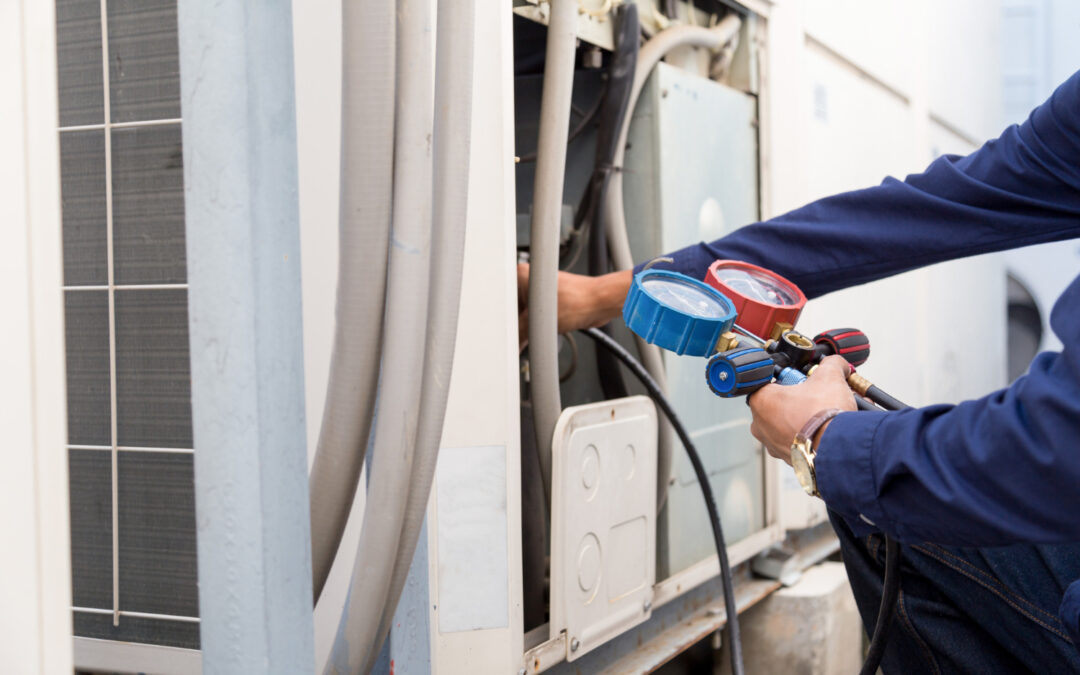It might seem surprising that an air conditioner can freeze up on the hottest days of summer in Aurora. But it happens more often than many homeowners expect. The last thing you want during a heatwave is a frozen AC shutting off just when you need it most. A frozen air conditioning unit can lead to reduced airflow, less cooling, and longer-term damage if ignored. Understanding why it happens is the first step to stopping it from disrupting your household.
This problem usually starts small. Maybe you notice the air isn’t blowing as cold as before, or your system runs longer than usual. Then one day, you glance at your outdoor unit and see ice on the coils. It’s a clear sign something is off. Whether it’s low refrigerant or poor airflow, knowing the root cause helps you solve the issue before it becomes a major repair or leads to a total AC shutdown.
Common Causes Of AC Freezing Up
If your AC freezes during peak summer temperatures in Aurora, there’s likely an underlying issue that needs attention. Cooling systems are built to handle heat, so freezing is not normal. Here are three of the most common reasons it happens.
1. Low Refrigerant Levels
Refrigerant levels that drop too low can cause the temperature of the evaporator coil to fall below freezing. As the humidity in your indoor air passes over the coil, it turns into ice instead of cooling the air. This not only reduces your AC’s performance but can lead to full system failure over time if not fixed. Low refrigerant usually means there’s a leak somewhere in the system, which shouldn’t be ignored.
2. Airflow Obstruction
Your AC relies on smooth airflow to absorb and move heat properly. If filters are clogged or vents are blocked, the lack of airflow causes cold air to build up on the evaporator coil rather than circulate throughout the house. This makes the coil too cold and leads to freezing. Something as simple as a dirty air filter can make a big difference when left unchanged.
3. Thermostat Issues
Running your AC with a thermostat set too low for long periods can trigger freezing. When the system constantly runs without rest, it puts stress on the components, especially during high temperatures. If the indoor air can’t cycle as designed, the cold builds up inside the system and starts freezing up key parts.
Freezing problems don’t usually stem from one cause alone. More often, it’s a mix of poor airflow, a struggling thermostat, or hidden refrigerant leaks. That’s why finding the exact reason requires a trained eye.
Warning Signs Your AC Is Freezing Up
Some signs of a freezing AC are easy to miss at first. As the system jams up slowly, it can still run, even while things inside start to go wrong. Watch for these early clues so you can catch the problem before it gets worse:
– Weak or reduced air blowing from your vents, even when your thermostat is set low
– A visible build-up of ice on the outdoor unit or indoor evaporator coil
– Unusual noises like rattling or hissing that weren’t there before
– Water leaks around the unit once it starts to thaw
– Your AC keeps running without turning off, even after reaching the set temperature
For example, a homeowner in Aurora once ignored faint clicking sounds coming from their system, thinking it was just the unit turning on and off. A few days later, their AC froze completely, and airflow died out. Catching those small changes early could’ve prevented a full breakdown.
If you notice any of these signs, it’s time to stop running the unit and get it inspected. Waiting too long might lead to more expensive damage or a complete system failure later.
Preventive Measures Homeowners Can Take
Once you understand what causes an AC to freeze, staying ahead of the problem gets a lot easier. Preventive steps can keep your system running the way it should, especially during Aurora’s hottest months. When you don’t have to worry about failures, summer feels a lot more manageable. The good news is, most of these steps are easy to follow and can help avoid unnecessary emergencies.
Here are some ways homeowners can reduce the risk of their AC freezing up:
– Schedule regular maintenance: Have a trained technician inspect and service your system at least once a year. This ensures proper refrigerant levels, clean coils, and healthy airflow
– Change filters often: A clogged filter restricts airflow. Replace it every 1 to 3 months during the cooling season. If you have pets or live in an area with heavy dust or pollen, consider checking it more frequently
– Keep vents unblocked: Make sure furniture or curtains are not covering supply or return vents. Air needs clear pathways to move efficiently throughout your home
– Watch your thermostat settings: Don’t set the thermostat lower than 68°F for extended periods. Let the system rest between cycles or use programmable settings to manage temperature changes automatically
– Check for signs: Drips, puddles, or frost build-up may mean your unit is working harder than it should. If you catch these early, you can stop the problem before it grows
Small tasks like these are easy to overlook, but they have a big impact. For instance, someone in Aurora shared that after forgetting to replace their air filter for several months, their system froze up during a stretch of high heat. The coil became packed with ice, and the unit shut off. A quick filter check could’ve saved them from a mid-summer AC failure.
When To Call For Professional AC Repair In Aurora
Some homeowners may feel tempted to troubleshoot AC issues on their own. But freezing problems often involve refrigerant leaks or electrical components that shouldn’t be handled without proper training. When your system shows signs of freezing repeatedly—even after filter changes or thermostat resets—it’s time to bring in a professional.
Persistent issues like:
– Ice forming again soon after thawing the system
– Warm air blowing even while the AC is running
– Unusual odors or noises from the vents
These point to problems beyond what surface-level maintenance can fix. Our professionals have the tools and experience to run diagnostics, test refrigerant pressure, inspect coils, and identify airflow restrictions. They know how to spot damage or wear that might not be obvious to the average homeowner.
Ignoring these warning signs can eventually cause the system’s compressor to fail, which may lead to a more extensive repair or even full replacement. Working with our technicians early saves both time and cost. A fast, skilled evaluation can prevent more serious breakdowns and help keep your home comfortable during the most extreme parts of Aurora’s summer.
Keep Your AC Running Right Through Summer
When an AC unit freezes up in the middle of summer, it’s more than an inconvenience. It disrupts daily life, adds stress, and can lead to costly damage. The good news is, once you understand what causes freezing, you’re in a better place to address it early. Whether it’s low refrigerant, restricted airflow, or just a thermostat running too cold for too long, these problems don’t solve themselves.
Taking the right steps—watching for signs, maintaining filters, and managing your settings—builds confidence in your system’s reliability. Stay alert to minor warning signals and don’t wait to call in help when the solution needs more than a quick fix. In Aurora’s warm season, a working AC isn’t just a comfort—it’s part of your home’s daily function. Getting ahead of freezing problems will keep the cool air flowing without unexpected stops.
When your AC starts showing freezing signs in Aurora, it could signal underlying issues that require professional attention. Taking a proactive approach with timely inspections and necessary repairs helps prevent system failures during peak summer months. Trust AC repair in Aurorafor expert diagnostics and efficient solutions that restore comfort to your home. Guaranteed Mechanical is committed to resolving your AC concerns with precision and care. For a quick estimate or to book a service visit, please contact us today.




Recent Comments